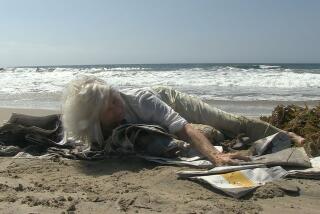The Countess of Forli: A POEM FOR VOICES by Ann Stanford (Orirana: $40; 62 pp., illustrated)
- Share via
Machiavelli, writing in “The Prince”--his primer for the Medici counsels: “The manner in which we live, and that in which we ought to live, are things so wide asunder, that he who quits the one to betake himself to the other is more likely to destroy than to save himself; since anyone who would act up to a perfect standard of goodness in everything, must be ruined among so many who are not good.” What prince in the fragmented Italy of warring city-states in an Age of Despots during Machiavelli’s time would disagree? Or what princess?
And thereby hangs a tale. Here in Ann Stanford’s 62-page poetic drama, the “princess” is Caterina Sforza, who from 1488 through 1499 ruled Forli and Imola, two papal cities in the Romagna just south of Bologna; ruled in the customary manner, which is to say as a tyrant at times, a warrior when need be, a vengeful demon when aroused . . . or lover, and otherwise to suit the circumstance.
All well and good. When in Romagna do as the Romagnese do . . . and, besides, doesn’t the end justify the means? So in “The Countess of Forli,” the reader is eased into a lively historical romance with the extra fillip of seeing its central figure, this iron lady, give a virtuoso performance in the man’s world of soldiery and Machiavellian politics. Virago is a word her admirers coined for her to celebrate her remarkable courage and panache.
When Cesare Borgia’s troops attacked her fortress of Ravaldino outside Forli, she herself took up the sword. Her adviser thought this most unseemly and pronounced that war was not for women! She fired back: “So women are blamed as soft, ephemeral / tender and wavering, not fitted for great deeds. / But when the Greeks made war, whom did they pray to? / Athene, the warrior maid. . . .”
She reminded him, too, of the pantheon of heroic amazons: Penthiselea, Zenobia, Judith, Jael, Eleanor of Aquitaine, Joan of Arc. “So do not say to me a woman / faints at the sight of blood or cannot fight.” Her adviser countered: “To find such women you search all history. / Brave men come crowding through a single age.” She was unimpressed.
Victory was not to be found despite her derring-do. Cesare carried her off to imprisonment within that great, grim pile of stone, Rome’s Castel Sant’Angelo. She was 36 and had lost Forli forever, was never to fight again, but had become a legend: the great virago ! Upon her release, the populace sang her praises. Her final days were spent in a convent.
While the historical romance aspect of the story prevails in this work, it is more deeply a chronology of one who lived not as she ought, but as prompted by the moment. When her lover, Giacomo Feo, was assassinated, she had meted out Draconian punishment, slaughtering 40 Forlivese, including children. That crime and others weighted heavily upon her. . . . No, the end does not justify the means! She sought redemption . . . lamented to her son: Each person finds his own peculiar daemon: / . . . Some meditate on heaven, some / color their days and nights with lechery, / and some in sin are lost too deep for hell. / And such a one am I, Scipio, / who find in cruelty supremest pleasure / . . . I shall not suffer for vicarious sin / but for the thought incarnate and complete .
Later alone, she cried out: Oh, bloody hands, how can you reach to God?
Poet Ann Stanford writes a powerful line, but, as dramatist, suffers a few lapses. Drama is a happening, and this piece unfortunately stumbles at the very start by opening with lengthy exposition. Later, in a scene with visiting soldier-nobleman Fracasso, who is suspected of being a spy, Caterina offers but a pretty speech; there is no probing on her part, no inquiry, fishing. Odd. One episode--an important one--strains belief. It is when French army commander D’Allegre, with his troops readied, threatens to sack Rome if the now downtrodden Caterina, bereft of power-fortune-estate, is not released from prison. Sack Rome because of this ? Never. Yet on the historic-romance level, all is acceptable and “The Countess of Forli” then a grand tale, with grand lines (mercifully unrhymed) that drum along pleasingly to an iambic-anapestic beat.
More to Read
The biggest entertainment stories
Get our big stories about Hollywood, film, television, music, arts, culture and more right in your inbox as soon as they publish.
You may occasionally receive promotional content from the Los Angeles Times.










